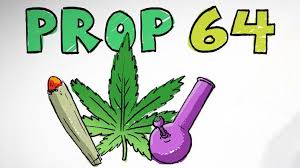EUPHORIA: California becomes the fourth state to legalize recreational use of marijuana for adults, which will prove to be beneficial for the economy.
By Natalie Apostol, Staff Writer
Dating back to the Progressive Era, the United States holds a longstanding history opposing marijuana. The original stigma against the drug began during a time period when many Americans feared people of color and associated marijuana usage with them. According to Jessica Roy of the Los Angeles Times, proposal of the ordinance was inspired by anti-immigration sentiments and “public fears of ‘marihuana,’ which some believed came across the border with the immigrants and turned users into raging violent lunatics.” Attorney Leo Paoli made the first of several attempts to challenge drug laws in 1972 with Proposition 19, which stated that those over the age of 18 would not be punished for possession of cannabis. Though the proposition failed to gain majority support and passage, it led to further research on the effects of cannabis use.
When researchers found marijuana usage to be beneficial to a certain degree in cases treating those with eating disorders, cancer and other serious illnesses, California passed Proposition 215 in 1996 permitting the drug for medicinal purposes. Since then, the Bureau of Medical Marijuana Regulation has been established and three additional states have legalized its recreational use. With the passage of Proposition 64 earlier this month, adults in California are allowed to consume the drug both medicinally and recreationally. Though there is still a social stigma against it, legalization of this drug carries more benefits than negative consequences. Proposition 64 will promote a safer society with more effective criminal justice and a stronger economy.
Passing this law will benefit the economy through added tax revenue. With the legalization and cannabis sales, tax money will go toward funding more research and educational programs for drug addiction prevention. According to the American Civil Liberties Union (ACLU), the drug raised issues of inequity between blacks and whites in jail, as blacks are 3.73 times more likely to be arrested than whites for simple possession. “Groups like the American Civil Liberties Union have pushed for legalization as a matter of criminal-justice reform. In large part this is because minorities are disproportionately detained and jailed for cannabis-related offenses,” Katy Steinmetz of TIME Magazine stated. Therefore, it would also reduce prison populations and cut law enforcement costs since many are sentenced to jail for simple possession of hemp.
However, many still vocalize their opposition to it. For example, Fresno Bee’s editorial board wrote an article titled “Vote ‘no’ on half-baked Proposition 64,” claiming, “[…] there hasn’t been sufficient research into the long-terms health effects of using marijuana. What little we do know isn’t good […] And for people predisposed to schizophrenia, the drug may trigger its onset and intensify symptoms.” Marijuana could impose potential threats to those with schizophrenia, but there are several regulations to the proposition that would prevent harm. The law prohibits consumption of marijuana in public settings and tobacco-free zones, similar to regulations on alcohol in regards to public intoxication. Consumers are also restricted from driving under the influence of the drug and must be at least 21 years old to use it. Other substances such as alcohol and smoking tobacco also pose threats to those with diseases; yet they’re not banned under legislation. They are properly regulated, and marijuana will be treated similarly.
“Like any drug, there will always be some [negative] side effect, but if people are willing to pay money to use it, we shouldn’t stop them. Cigarettes have been legal for decades, but there are no complaints because there’s less stigma against it. This is [also] something that can help to reduce lying and suspicion among people that have been using it illegally,” Paola Sabel (12) said.
Proposition 64 is an important stepping stone in solving present issues with the drug already existing and the drug war as a whole. Because the law provides a safe, regulated environment for marijuana users, legalizing marijuana will positively impact California economically and socially. Legalization goes beyond “smoking for fun” and can lead to progression in our society through scientific research and education.

